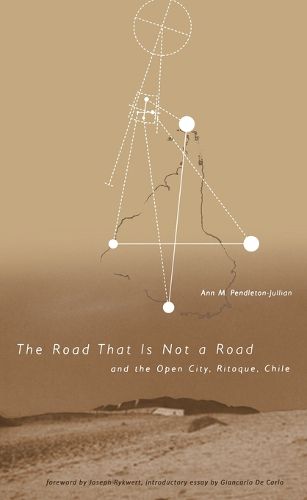Readings Newsletter
Become a Readings Member to make your shopping experience even easier.
Sign in or sign up for free!
You’re not far away from qualifying for FREE standard shipping within Australia
You’ve qualified for FREE standard shipping within Australia
The cart is loading…






Several thousand miles south of the equator along the Pacific coast of South America, is the site of the Open City Amereida. It is a laboratory for thought and work, conceived and built by the faculty of architecture of the Catholic University of Valparaiso. Here architects, poets, artists and engineers have been engaged in one of architectural education’s most radical experiments for several decades. The school has long been a destination for those seeking an alternative to conventional academic practice and teaching. Now, its significance is being felt beyond the borders of Chile and South America. Ann Pendleton-Jullian tells the story of the Open City in Ritoque, Chile, a designed city still in formation that has no master plan, no imposed ordering devices, and no hierarchical networks of infrastructure. The strange buildings placed among dunes and grasslands reflect instead the mind’s translation of urban phenomena and natural phenomena relative to the construction of memory, and a process of composition that is not dependent on stylistic precedents, drawing boards, or academic discourse. Teaching takes place on site and employs poetic methods to activate the design process; the endeavour is considered more important than the result. More than 100 photographs are included, capturing the spirit of the place and of its architecture. Pendleton-Jullian discusses influences behind the Open City - the work and working methods of Surrealist French poets, the words and creative attitude of Le Corbusier, the heritage of the South American landscape and culture. Some of the more provocative issues that the work raises include the idea of city as it relates to human activity, to its physical reality and to its intention; the premise of utopianism that rejects the foundations of utopia building; and issues of the sacred relative to the landscape in a modern culture.
$9.00 standard shipping within Australia
FREE standard shipping within Australia for orders over $100.00
Express & International shipping calculated at checkout
Stock availability can be subject to change without notice. We recommend calling the shop or contacting our online team to check availability of low stock items. Please see our Shopping Online page for more details.
Several thousand miles south of the equator along the Pacific coast of South America, is the site of the Open City Amereida. It is a laboratory for thought and work, conceived and built by the faculty of architecture of the Catholic University of Valparaiso. Here architects, poets, artists and engineers have been engaged in one of architectural education’s most radical experiments for several decades. The school has long been a destination for those seeking an alternative to conventional academic practice and teaching. Now, its significance is being felt beyond the borders of Chile and South America. Ann Pendleton-Jullian tells the story of the Open City in Ritoque, Chile, a designed city still in formation that has no master plan, no imposed ordering devices, and no hierarchical networks of infrastructure. The strange buildings placed among dunes and grasslands reflect instead the mind’s translation of urban phenomena and natural phenomena relative to the construction of memory, and a process of composition that is not dependent on stylistic precedents, drawing boards, or academic discourse. Teaching takes place on site and employs poetic methods to activate the design process; the endeavour is considered more important than the result. More than 100 photographs are included, capturing the spirit of the place and of its architecture. Pendleton-Jullian discusses influences behind the Open City - the work and working methods of Surrealist French poets, the words and creative attitude of Le Corbusier, the heritage of the South American landscape and culture. Some of the more provocative issues that the work raises include the idea of city as it relates to human activity, to its physical reality and to its intention; the premise of utopianism that rejects the foundations of utopia building; and issues of the sacred relative to the landscape in a modern culture.